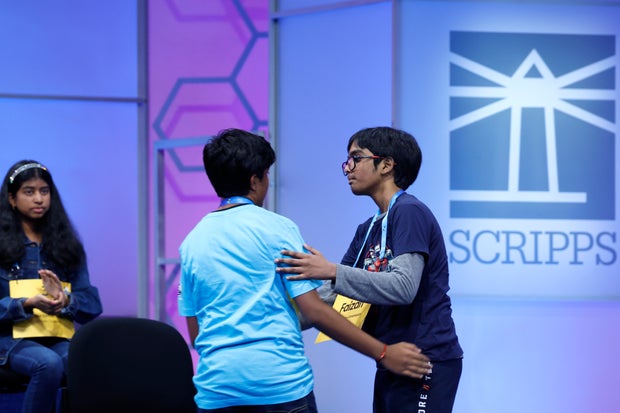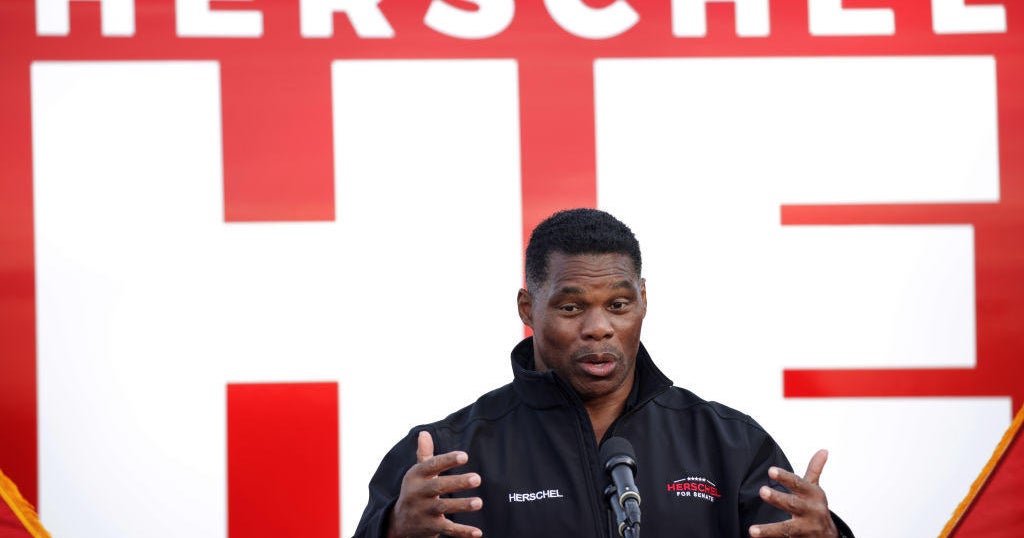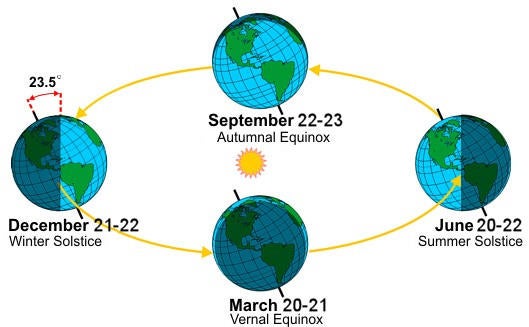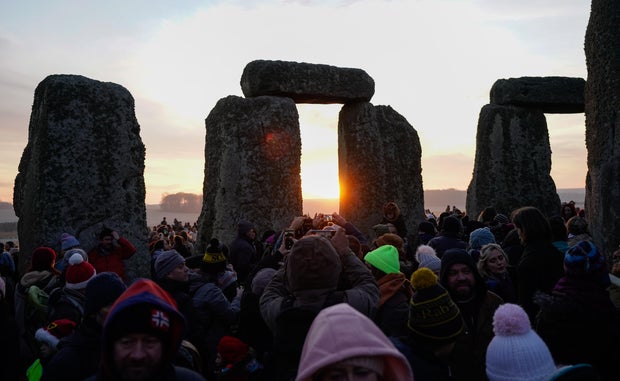CBS News
8 National Spelling Bee finalists eye trophy, cash prize

Eight finalists will spell their hearts out Thursday night, hoping to take home the brightly painted Scripps National Spelling Bee trophy, along with more than $50,000 in cash and prizes.
The champion won’t be Shradha Rachamreddy, who finished third last year and was a consensus favorite to go all the way. She was eliminated Wednesday on exactly the sort of “super short, tricky word” she said she concentrated on studying after misspelling “orle” last year. This year it was “varan,” a type of lizard. She added an extra “r,” and former spellers in the audience gasped at her mistake.
“I am in shock and despair,” said Dev Shah, the 2023 champion.
“We all thought she was going to win,” added Charlotte Walsh, last year’s runner-up.
Anna Moneymaker/Getty Images
Starting in the quarterfinals, the bee’s word panel can use any of the more than half a million words in Webster’s Unabridged dictionary, plus some geographical names that aren’t even listed in that volume. While the panel tries to maintain a consistent level of difficulty in each round, it can vary from word to word.
This year’s finalists are Rishabh Saha, 14; Shrey Parikh, 12; Aditi Muthukumar, 13; Bruhat Soma, 12; YY Liang, 12; Ananya Rao Prassanna, 13; Faizan Zaki, 12; and Kristen Tiffany Santos, 13.
Bruhat, a seventh-grader from Tampa, Florida, will try to run his winning streak to four on Thursday night, when he competes for the championship title against seven other spellers, some of whom he vanquished in those other bees.
The number of finalists is the fewest since 2010, when Scripps had to stop a semifinal round out of fear it would bring too few spellers to the primetime telecast, then on ABC. The bee is now broadcast on Ion — owned by Scripps, a Cincinnati-based media company — and when Wednesday’s last semifinal round had a lengthy delay after six of the first 10 spellers missed their words, a similar stoppage didn’t appear out of the question.
Anna Moneymaker/Getty Images
Scripps said the delay was due to the technical issues that plagued the bee all day. Live results weren’t posted as usual, and at one point, former champion Kavya Shivashankar, tasked with saying a heartfelt goodbye to spellers who heard the bell, was handed the biography of the wrong speller and began reading it before the crowd informed her of the mix-up.
Despite some surprising eliminations in the semifinals, the eight finalists are the usual impressive group — albeit on the young side. Only three are eighth-graders in their final year of eligibility.
Shrey and Faizan are close friends with Bruhat, and all three are tutored by Evans.
“I’m not really surprised that any of my students have made it this far. I know that they are all prepared. They have what it takes to win, all of them,” Evans said.
Matt McClain/The Washington Post via Getty Images
Bruhat in particular has impressed his coach and other onlookers with his clear command of the dictionary.
“We get through so many words per class, more than I’ve seen with any other speller. His work ethic is incredible,” Evans said. “Once he misses a word, he very rarely would miss it again. He sees it and he remembers it.”
Faizan became a crowd favorite during the semifinals for his fist-pumping excitement when he spelled correctly, and for his empathy — he rushed over and gave a big hug to his good friend Aryan Khedkar when Aryan was eliminated.
“It was just so sad to see him lose in his last year,” Faizan said. “So I just wanted to be supportive and, like, get him through this tough time.”
CBS News
Social Security Fairness Act passes U.S. Senate

Legislation to expand Social Security benefits to millions of Americans passed the U.S. Senate early Saturday and is now headed to the desk of President Joe Biden, who is expected to sign the measure into law.
Senators voted 76-20 for the Social Security Fairness Act, which would eliminate two federal policies that prevent nearly 3 million people, including police officers, firefighters, postal workers, teachers and others with a public pension, from collecting their full Social Security benefits. The legislation has been decades in the making, as the Senate held its first hearings into the policies in 2003.
“The Senate finally corrects a 50-year mistake,” proclaimed Senate Majority Leader Chuck Schumer, a Democrat from New York, after senators approved the legislation at 12:15 a.m. Saturday.
The bill’s passage is “a monumental victory for millions of public service workers who have been denied the full benefits they’ve rightfully earned,” said Shannon Benton, executive director for the Senior Citizens League, which advocates for retirees and which has long pushed for the expansion of Social Security benefits. “This legislation finally restores fairness to the system and ensures the hard work of teachers, first responders and countless public employees is truly recognized.”
The vote came down to the wire, as the Senate looked to wrap up its current session. Senators rejected four amendments and a budgetary point of order late Friday night that would have derailed the measure, given the small window of time left to pass it.
Vice President-elect JD Vance of Ohio was among the 24 Republican senators to join 49 Democrats to advance the measure in an initial procedural vote that took place Wednesday.
“Social Security is a bedrock of our middle class. You pay into it for 40 quarters, you earned it, it should be there when you retire,” Ohio Senator Sherrod Brown, a Democrat who lost his seat in the November election, told the chamber ahead of Wednesday’s vote. “All these workers are asking for is for what they earned.”
What is the Social Security Fairness Act?
The Social Security Fairness Act would repeal two federal policies — the Windfall Elimination Provision (WEP) and the Government Pension Offset (GPO) — that reduce Social Security payments to nearly 3 million retirees.
That includes those who also collect pensions from state and federal jobs that aren’t covered by Social Security, including teachers, police officers and U.S. postal workers. The bill would also end a second provision that reduces Social Security benefits for those workers’ surviving spouses and family members. The WEP impacts about 2 million Social Security beneficiaries and the GPO nearly 800,000 retirees.
The measure, which passed the House in November, had 62 cosponsors when it was introduced in the Senate last year. Yet the bill’s bipartisan support eroded in recent days, with some Republican lawmakers voicing doubts due to its cost. According to the Congressional Budget Office, the proposed legislation would add a projected $195 billion to federal deficits over a decade.
Without Senate approval, the bill’s fate would have ended with the current session of Congress and would have needed to be re-introduced in the next Congress.
CBS News
12/20: CBS Evening News – CBS News

Watch CBS News
Be the first to know
Get browser notifications for breaking news, live events, and exclusive reporting.
CBS News
Saturday is the winter solstice and 2024’s shortest day. Here’s what to know about the official start of winter.

The 2024 winter solstice, the shortest day of the year, happens on Saturday, Dec. 21, in the Northern Hemisphere. The celestial event signifies the first day of winter, astronomically.
What is the winter solstice?
The winter solstice is the day each year that has the shortest period of daylight between sunrise and sunset, and therefore the longest night. It happens when the sun is directly above the Tropic of Capricorn, a line of latitude that circles the globe south of the equator, the National Weather Service explains.
The farther north you are, the shorter the day will be, and in the Arctic Circle, the sun won’t rise at all.
How is the day of the winter solstice determined?
The winter solstice occurs because of the Earth’s tilt as it rotates around the sun.
When the Northern Hemisphere tilts away from the sun, the nights last longer. The longest night happens on the solstice because the hemisphere is in its furthest position from the sun. That occurs each year on Dec. 21 or 22.
This year, it falls on Dec. 21 at 4:21 a.m ET, to be precise.
On the summer solstice, when the northern tilt is closest to the sun, we have the longest day, usually June 20 or 21.
National Weather Service
The solstices are not always exactly on the 21st every year because the earth’s rotation around the sun is 365.25 days, instead of 365 even.
Will days start getting longer after the winter solstice?
Yes. Each day after the solstice, we get one minute more of sunlight. It doesn’t sound like much, but after just two months, or around 60 days, we’ll be seeing about an hour more of sunlight.
When will winter officially be over in 2025?
The meteorological winter ends on March 20, 2025. Then, spring will last until June 20, when the summer solstice arrives.
How is the winter solstice celebrated around the world?
Nations and cultures around the world have celebrated the solstice since ancient times with varying rituals and traditions. The influence of those solstice traditions can still be seen in our celebrations of holidays like Christmas and Hanukkah, Britannica notes.
The ancient Roman Saturnalia festival celebrated the end of the planting season and has close ties with modern-day Christmas. It honored Saturn, the god of harvest and farming. The multiple-day affair had lots of food, games and celebrations. Presents were given to children and the poor, and slaves were allowed to stop working.
Gatherings are held every year at Stonehenge, a monumental circle of massive stones in England that dates back about 5,000 years. The origins of Stonehenge are shrouded in mystery, but it was built to align with the sun on solstice days.
Andrew Matthews/PA Images via Getty Images
The Hopi, a Native American tribe in the northern Arizona area, celebrate the winter solstice with dancing, purification and sometimes gift-giving. A sacred ritual known as the Soyal Ceremony marks the annual milestone.
In Peru, people honor the return of the sun god on the winter solstice. The ancient tradition would be to hold sacrificial ceremonies, but today, people hold mock sacrifices to celebrate. Because Peru is in the Southern Hemisphere, their winter solstice happens in June, when the Northern Hemisphere is marking its summer solstice.
Scandinavia celebrates St. Lucia’s Day, a festival of lights.
The “arrival of winter,” or Dong Zhi, is a Chinese festival where family gathers to celebrate the year so far. Traditional foods include tang yuan, sweet rice balls with a black sesame filling. It’s believed to have its origins in post-harvest celebrations.
Researchers stationed in in Antarctica even have their own traditions, which may include an icy plunge into the polar waters. They celebrate “midwinter” with festive meals, movies and sometimes homemade gifts.












